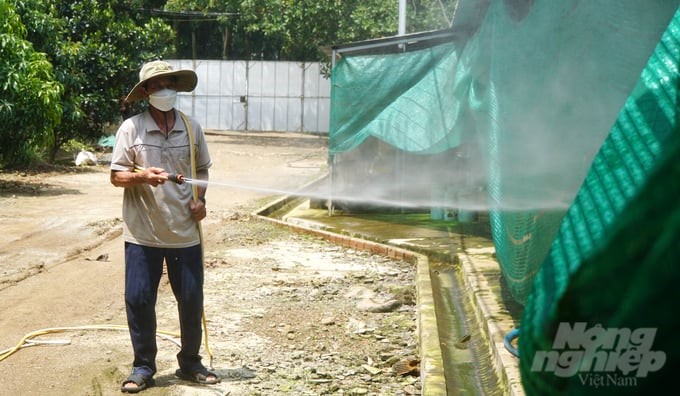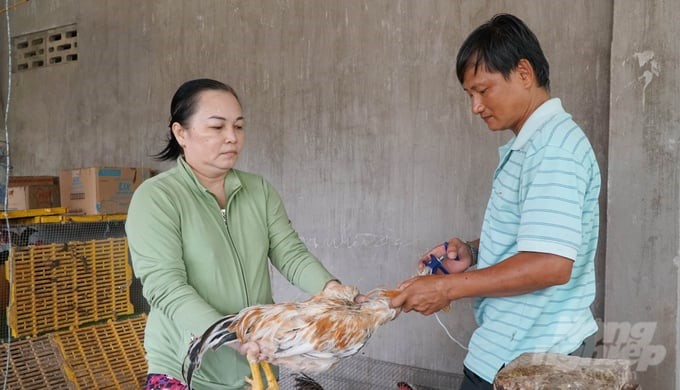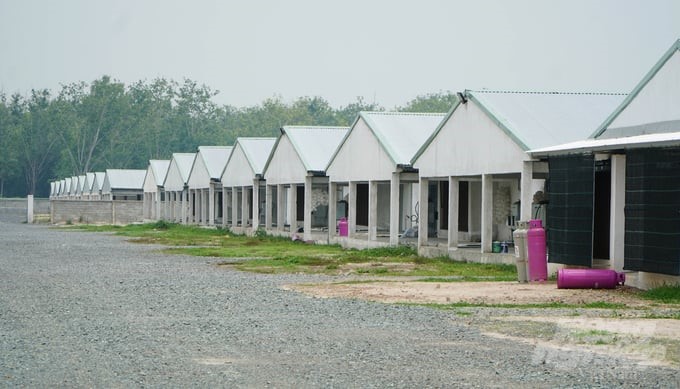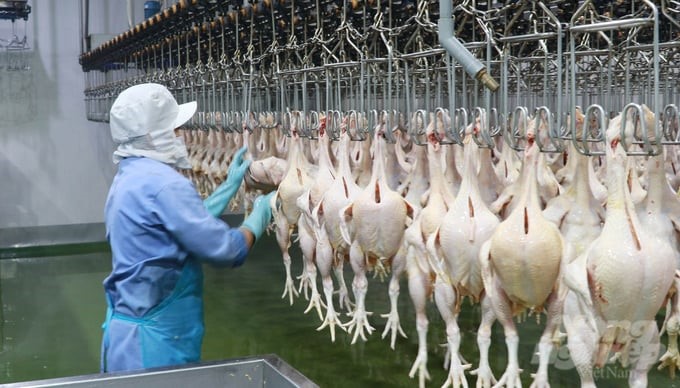June 2, 2025 | 13:56 GMT +7
June 2, 2025 | 13:56 GMT +7
Hotline: 0913.378.918
June 2, 2025 | 13:56 GMT +7
Hotline: 0913.378.918

Biosafety farming has become an inevitable trend. Photo: Le Binh.
In recent years, Tay Ninh has attracted many strategic investors, helping the province's livestock industry face an important turning point for breakthrough. With the strategy of developing industrial livestock farming that applies high technology, ensures biosafety, and is eco-friendly, Tay Ninh has a lot of geographical balance to aim for the export of livestock products.
Biosafety farming linkage in Tay Ninh has become an inevitable trend in recent times. This is encouraged by the People's Committees at all levels and the Provincial Department of Agriculture and Rural Development and is responded to by people because of its sustainability, efficiency, and safety.
In addition to large-scale biosafety farming, building disease-free areas is one of the important solutions to proactively prevent and control diseases. Particularly, in order for Tay Ninh's livestock products to participate in the global livestock product supply chain, the livestock production chain must be public and transparent in breeds, feed, disease prevention, pre-processing, and processing.
Therefore, promoting the construction of disease-free livestock areas and chains not only serves livestock disease prevention and control in Tay Ninh but also ensures the supply of livestock products for the domestic market and boosts exports.
Currently, in the province, Duong Minh Chau district and 6 commune-level facilities in Go Dau district are certified as disease-free for bird flu and Newcastle diseases in chicken, and 71 other livestock facilities are certified as disease-free. In the 2024–2025 period, Tay Ninh strives to have three more district-level areas (Tan Chau, Tan Bien, and Go Dau) achieve disease safety according to Vietnam's regulations.
On May 19, Tay Ninh announced a disease-free area in Tan Chau district. This is an important event for the development of high-tech agriculture in particular and the agricultural sector in general in Tay Ninh province.
Mr. Tran Van Chien, Vice Chairman of the Tay Ninh Provincial People's Committee, said that the value of the province's agricultural sector currently accounts for 19% of GRDP, with the livestock industry alone accounting for 23% of the agricultural sector's value. Developing high-tech livestock farming in disease-free areas will be the foundation for agricultural development.
"The disease-free area in Tan Chau is a chain that ensures disease-free livestock production, a nucleus for livestock production development in the province, and is among the province's three breakthrough stages in the agricultural sector," said Mr. Chien.

Tay Ninh regularly strengthens the control and vaccination of household livestock herds to control disease-free areas. Photo: Le Binh.
Tay Ninh also strives to have five district-level regions (Tay Ninh city, Hoa Thanh town, Trang Bang town, Ben Cau district, and Chau Thanh district) achieving disease safety according to Vietnam's regulations; two district-level regions (Tan Bien and Tan Chau) achieving disease safety for bird flu and Newcastlea diseases according to the regulations of the World Organization for Animal Health (WOAH/OIE).
According to Mr. Nguyen Dinh Xuan, Director of the Tay Ninh Department of Agriculture and Rural Development, building disease-free areas is important for the province's livestock production development, enhancing product value, and providing safe products to serve domestic consumption needs and aim for export.
"This is a favorable condition for businesses operating in the field of animal production and animal production processing to feel secure in production and business. At the same time, this attracts businesses to prioritize investment selection.
Thereby, the province will attract many investors into this field, especially those that apply high technology, have chain linkages, and aim for export, contributing to restructuring livestock production in the province. and opening up sustainable livestock production development," said Mr. Xuan.

Tay Ninh is developing the livestock industry in the direction of value chain, quality, efficiency, and meeting international standards to expand the market. Photo: Le Binh.
The disease-free area is likened to a "passport" so that Tay Ninh's livestock products can go to demanding markets. This was also confirmed by Deputy Minister of Agriculture and Rural Development Phung Duc Tien at many conferences and directed: "To increase the export of livestock products, it is compulsory to build disease-free livestock facilities and areas."
According to Director of the Department of Animal Health Nguyen Van Long, disease-free areas are extremely important to the livestock industry. According to regulations of the World Organization for Animal Health (WOAH/OIE), when exporting animal products, it is required to comply with regulations and criteria on disease-free areas.
"To be able to export livestock products, there is no other way than to comply with the regulations of WOAH/OIE. We have been building disease-free areas for many years. As of now, we have gotten positive results in exporting livestock products to markets such as South Korea and Hong Kong (China) and exporting chicken meat to Japan," shared Mr. Long.
In Tay Ninh, diseases in poultry flocks are controlled quite well. Since 2016, the province has not had a bird flu epidemic. Tay Ninh also has two businesses exporting livestock products, namely Vietnam Agroresources Management Co., Ltd., which exports chicken eggs to Hong Kong and the Maldives, and Vinamilk Company, which exports to 60 countries, including the US, China, South Korea, Japan, Singapore, etc. Some other businesses are also investing with clear intentions to export livestock products.
In 2023, the Department of Animal Health, the Department of Agriculture and Rural Development of the provinces of Dong Nai, Ba Ria-Vung Tau, Binh Duong, Binh Phuoc, Lam Dong, Tay Ninh, and Long An, and De Heus Vietnam signed an agreement to coordinate to build a safe chicken meat production chain in the 2023–2028 period.
It is expected that by December 2025, all slaughterhouses and chicken meat pre-processing and processing facilities will ensure food safety and be certified for quality management based on Hazard Analysis and Critical Control Point (HACCP). This is an analysis tool to ensure food hygiene and safety, GlobalGAP, ISO 22000, and Halal standards.
Mr. Tran Van Chien, Vice Chairman of Tay Ninh Provincial People's Committee, said that the province will continue to implement trade promotion activities and strengthen the implementation of the project "Strengthening international cooperation to build and develop Vietnam's Halal industry until 2030."
According to Tay Ninh province's planning for the 2021–2030 period and vision to 2050 that has just been approved by the Prime Minister, Tay Ninh will develop agriculture in the direction of value chain, quality, efficiency, and meeting international standards to expand the market.
At the same time, the province's agricultural sector will strive to improve efficiency and profits by promoting the application of advanced technology, mechanization, automation, computerization, digitalization, and the circular economy.

Tay Ninh is also attracting many investors into the work of slaughtering, pre-processing, and processing chicken meat to ensure food safety and meet export requirements. Photo: Tran Trung.
Tay Ninh province is aiming to develop stable and sustainable livestock production towards biosafety, minimizing cattle diseases, industrialization, and modernization.
Mr. Nguyen Thanh Ngoc, Chairman of the Tay Ninh Provincial People's Committee, affirmed: "By our responsibility, we commit to creating the most favorable conditions and respectfully call on domestic and foreign investors to come to Tay Ninh. We always share and accompany you. The success of investors is the success and growth of the province."
The province strives to develop pig herd, beef cattle, and dairy cow farming in the direction of industrial farms and high-tech farms with high-yield varieties and potential local varieties by 2030. Tay Ninh also aims to build at least two district-level disease-free livestock areas by 2025 and three district-level areas by 2030.
This is also one of the stepping stones by which Tay Ninh attracts investors, turning the province's localities into "bases" to build chains and processing facilities to serve exports.
Currently, Tay Ninh has 81 VietGAHP-certified livestock facilities and 71 other disease-free livestock facilities with disease safety certificates. In 2023, livestock farming in the province developed strongly, with a pig herd of 297,000 heads (up 28.5% over the same period) and a poultry herd of over 9.5 million heads (up 5.6% over the same period). In particular, farm livestock farming accounts for 78% (up 8% over the same period).
The highlight is a strong attraction to investment in livestock projects, including projects oriented to forming value and linkage chains with people by strategic investors such as Hung Nhon Group, De Heus Group, BAF Company, and Vinamilk Company.
Translated by Thu Huyen

(VAN) TTC AgriS and IFC signed a strategic partnership to develop a sustainable agricultural value chain, aiming to achieve the Net Zero target by 2035.

(VAN) Seafood by-products are opening a new path, combining green growth and technological innovation to enhance the industry's value.

(VAN) Mr. Nguyen Thanh Cong, Vice Chairman of the Son La Provincial People's Committee, reflects on Son La’s journey from barren hills to fruitful orchards after a decade of hard work.

(VAN) FAO’s Director-General addresses the 5th Baghdad International Water Conference.
/2025/05/26/1716-4-nongnghiep-191706.jpg)
(VAN) Chain linkages, technological innovation, and raw material zoning are three strategic pillars for the coconut industry to strongly develop and elevate its position on the global agricultural map.
![Advanced mariculture – an inevitable trend: [4] Accompanied by scientists](https://t.ex-cdn.com/nongnghiepmoitruong.vn/608w/files/sohk/2025/05/13/1941-pgsts-vo-van-nha-140958_717.jpg)
(VAN) According to Assoc. Prof. Dr. Vo Van Nha, Director of the RIA III, the development of advanced offshore mariculture is no longer an option but an essential path for Vietnam’s fisheries sector.

(VAN) Vietnam is intensifying the development of mollusk farming areas that meet international standards, aiming for sustainable growth and enhancing its export position in the global seafood market.